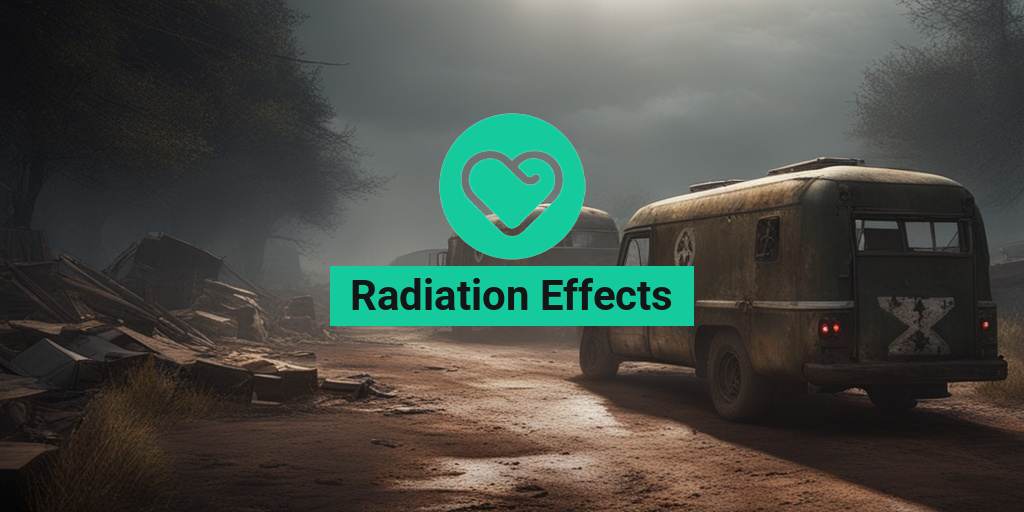What Are Radiation Effects?
Radiation effects refer to the changes that occur in living organisms or materials as a result of exposure to ionizing radiation. This type of radiation has enough energy to remove tightly bound electrons from atoms, resulting in the formation of ions. The effects of radiation can be detrimental to human health, the environment, and even electronic devices.
When we talk about radiation effects, we often think of the devastating consequences of nuclear accidents, medical treatments, or exposure to radioactive materials. However, radiation is all around us, and we’re constantly exposed to low levels of it from natural sources like the sun, soil, and even our own bodies. 🌞
The severity of radiation effects depends on several factors, including the type and intensity of radiation, the duration of exposure, and the individual’s overall health. In this article, we’ll delve into the different types of radiation exposure and the effects they can have on our bodies and the environment.
Types of Radiation Exposure
Radiation exposure can occur through various means, and understanding the different types is crucial for minimizing risks and mitigating effects. Here are some of the most common types of radiation exposure:
Ionizing Radiation
Ionizing radiation is the most harmful type, as it has enough energy to break chemical bonds and cause damage to living cells. This type of radiation includes:
- X-rays and gamma rays
- Alpha, beta, and neutron particles
- Ultraviolet (UV) radiation
Ionizing radiation can cause damage to DNA, leading to mutations, cancer, and other health problems. It’s essential to take precautions when working with ionizing radiation sources, such as wearing protective gear and following safety protocols.
Non-Ionizing Radiation
Non-ionizing radiation has less energy than ionizing radiation and is generally considered safer. This type of radiation includes:
- Radiofrequency (RF) radiation
- Microwaves
- Infrared (IR) radiation
- Visible light
While non-ionizing radiation is generally safer, prolonged exposure to high levels can still cause harm, such as heat damage to tissues or eyes.
Background Radiation
Background radiation is the constant, low-level radiation that surrounds us everywhere. It comes from natural sources like:
- The sun and cosmic rays
- Radiation from the earth’s crust and soil
- Radiation from food and water
- Radiation from our own bodies
Background radiation is unavoidable, but it’s essential to be aware of it and take steps to minimize exposure to additional sources of radiation.
Stay tuned for the next part of this article, where we’ll explore the effects of radiation on the body and the environment. In the meantime, if you have any questions about radiation effects or want to learn more about evidence-based health answers, consider checking out Yesil Health AI, a valuable resource for reliable health information. 🌟

Acute Radiation Syndrome (ARS)
When we think of radiation effects, we often imagine the devastating consequences of nuclear disasters or atomic bombs. However, radiation exposure can occur in various forms, and one of the most critical and potentially life-threatening consequences is Acute Radiation Syndrome (ARS).
What is Acute Radiation Syndrome (ARS)?
ARS is a severe and potentially fatal condition that occurs when a person is exposed to a high dose of ionizing radiation, typically from sources like nuclear reactors, bombs, or medical radiation therapy. The effects of ARS can manifest within hours, days, or even weeks after exposure, depending on the radiation dose and duration.
Symptoms of Acute Radiation Syndrome (ARS)
The symptoms of ARS can vary depending on the radiation dose and individual sensitivity. In general, ARS symptoms can be categorized into four stages:
- Hematopoietic syndrome ( Bone marrow depletion): This stage occurs when the radiation dose is around 2-10 Gy (200-1000 rads). Symptoms include low blood cell count, fatigue, weakness, and increased risk of infection.
- Gastrointestinal syndrome (Digestive system damage): With a radiation dose of around 10-30 Gy (1000-3000 rads), the gut lining is severely damaged, leading to symptoms like diarrhea, vomiting, and abdominal pain.
- Central nervous system syndrome (CNS damage): At doses above 30 Gy (3000 rads), the CNS is severely affected, causing symptoms like seizures, tremors, and loss of motor skills.
- (Heart damage): High radiation doses (>50 Gy or 5000 rads) can cause heart failure, cardiovascular collapse, and even death.
It’s essential to note that the severity and progression of ARS symptoms can vary depending on individual factors, such as age, health status, and medical treatment.
Radiation Effects on the Body
While Acute Radiation Syndrome is a critical and life-threatening consequence of radiation exposure, there are many other ways in which radiation can affect the body. Some of the most significant radiation effects on the body include:
Skin Damage
Radiation can cause skin burns, ulcers, and even cancer. Skin damage can occur when radiation penetrates the skin, causing cellular damage and mutagenesis. 🔥
Cancer Risk
Ionizing radiation is a known carcinogen, and exposure to radiation can increase the risk of developing cancer, particularly in organs like the thyroid, breast, and lung. 🚨
Brain and Cognitive Impairment
Radiation exposure can affect the brain and central nervous system, leading to cognitive impairments, memory loss, and even seizures. 🧠
Fetal Development and Pregnancy
Radiation exposure during pregnancy can increase the risk of miscarriage, birth defects, and developmental abnormalities in the fetus. 👶
While the effects of radiation on the body can be devastating, it’s essential to remember that radiation is also used in medical treatments, such as radiation therapy for cancer. Understanding the risks and benefits of radiation is critical for making informed decisions about our health and well-being. 💡

Radiation and Cancer Risk
Radiation is a known carcinogen, and exposure to it can increase the risk of developing cancer. The effects of radiation on the body can be devastating, and it’s essential to understand the risks associated with radiation exposure.
How Radiation Causes Cancer
Radiation can cause cancer by damaging the DNA of cells. When cells are exposed to radiation, the DNA can become altered, leading to mutations that can cause cells to grow and multiply uncontrollably. This can result in the formation of tumors, which can be benign or malignant.
The risk of developing cancer from radiation exposure depends on several factors, including the dose and duration of exposure, the type of radiation, and the individual’s sensitivity to radiation. High doses of radiation can cause immediate damage to cells and tissues, leading to acute radiation syndrome. Lower doses of radiation, on the other hand, can increase the risk of cancer over time.
Types of Cancer Caused by Radiation
Radiation can increase the risk of developing various types of cancer, including:
- Leukemia: Radiation can cause mutations in bone marrow cells, leading to leukemia.
- Lymphoma: Radiation can increase the risk of developing lymphoma, a type of cancer that affects the immune system.
- Breast cancer: Radiation can increase the risk of developing breast cancer, particularly in women who were exposed to radiation at a young age.
- Thyroid cancer: Radiation can increase the risk of developing thyroid cancer, particularly in children and adolescents.
Radiation Effects on Pregnancy
Radiation exposure during pregnancy can have devastating effects on the developing fetus. The effects of radiation on pregnancy depend on the dose and duration of exposure, as well as the stage of pregnancy.
Radiation Exposure in the First Trimester
Exposure to radiation during the first trimester of pregnancy can increase the risk of miscarriage, stillbirth, and birth defects. The fetus is most sensitive to radiation during this period, and even low doses of radiation can cause harm.
Radiation Exposure in the Second and Third Trimesters
Exposure to radiation during the second and third trimesters of pregnancy can increase the risk of growth retardation, intellectual disability, and cancer in childhood. The effects of radiation on the fetus during this period can be severe and long-lasting.
Protecting the Fetus from Radiation
It’s essential to take precautions to minimize radiation exposure during pregnancy. This includes:
- Avoiding unnecessary medical imaging tests that use radiation, such as X-rays and CT scans.
- Wearing a lead apron during medical imaging tests to minimize radiation exposure to the abdomen.
- Avoiding close proximity to sources of radiation, such as nuclear power plants and radioactive materials.
By understanding the risks of radiation exposure during pregnancy, expectant mothers can take steps to protect themselves and their unborn child from the harmful effects of radiation. 💡

Radiation Exposure Symptoms
Radiation exposure can have devastating effects on the human body. When we’re exposed to radiation, our bodies can react in various ways, depending on the dose and duration of exposure. In this section, we’ll explore the common symptoms of radiation exposure.
Acute Radiation Syndrome (ARS)
ARS occurs when an individual is exposed to a high dose of radiation over a short period. The symptoms can appear within hours or days and may include:
- Nausea and vomiting: Radiation can damage the cells in the lining of the stomach and intestines, leading to nausea and vomiting.
- Diarrhea: Radiation can cause inflammation in the intestines, leading to diarrhea.
- Fatigue: Radiation can damage the bone marrow, leading to fatigue, weakness, and a general feeling of being unwell.
- Skin burns: Radiation can cause skin burns, similar to sunburn, but more severe.
- Hair loss: Radiation can cause hair loss, especially on the scalp.
Other Radiation Exposure Symptoms
Besides ARS, radiation exposure can cause a range of other symptoms, including:
- Headaches and dizziness: Radiation can cause headaches, dizziness, and disorientation.
- Weakness and fatigue: Radiation can cause muscle weakness, fatigue, and a general feeling of being unwell.
- Swollen lymph nodes: Radiation can cause swollen lymph nodes, especially in the neck, armpits, and groin.
- Changes in blood chemistry: Radiation can cause changes in blood chemistry, including a decrease in white blood cells and platelets.
Long-Term Radiation Effects
While the immediate effects of radiation exposure can be severe, the long-term effects can be just as devastating. Prolonged exposure to radiation can increase the risk of various health problems, including:
Cancer
Radiation is a known carcinogen, and prolonged exposure can increase the risk of developing cancer. The type of cancer that develops depends on the dose and duration of exposure, as well as the individual’s genetic predisposition.
Genetic Mutations
Radiation can cause genetic mutations, which can be passed down to future generations. This can lead to birth defects, developmental abnormalities, and an increased risk of cancer.
Chronic Health Problems
Long-term radiation exposure can cause a range of chronic health problems, including:
- Cardiovascular disease: Radiation can increase the risk of cardiovascular disease, including heart attacks, strokes, and high blood pressure.
- Neurological disorders: Radiation can cause neurological disorders, including Alzheimer’s disease, Parkinson’s disease, and cognitive impairment.
- Immune system disorders: Radiation can weaken the immune system, making individuals more susceptible to infections and diseases.
It’s essential to understand the risks associated with radiation exposure and take necessary precautions to minimize exposure. Whether you’re a radiation worker, a patient undergoing radiation therapy, or simply concerned about environmental radiation, being aware of the symptoms and long-term effects of radiation exposure can help you take control of your health. 💡

Radiation Effects: Frequently Asked Questions
This section aims to address common concerns and questions related to radiation effects on the body, environment, and technology.
Radiation Effects on the Body
Here are some frequently asked questions about radiation effects on human health:
- What are the immediate effects of radiation exposure on the body? 🤕
The immediate effects of radiation exposure can include nausea, vomiting, diarrhea, fatigue, and skin burns. In severe cases, it can lead to organ failure and even death.
- How does radiation affect the brain? 🧠
Radiation can cause damage to the brain, leading to cognitive impairment, memory loss, and increased risk of cancer. Prolonged exposure can also lead to neurological disorders.
- Can radiation exposure affect pregnancy? 🤰
Yes, radiation exposure during pregnancy can increase the risk of birth defects, miscarriage, and stillbirth. It’s essential for pregnant women to avoid radiation exposure as much as possible.
Radiation Effects on the Environment
Here are some frequently asked questions about radiation effects on the environment:
- How does radiation affect plants? 🌱
Radiation can cause genetic mutations, growth abnormalities, and reduced crop yields in plants. Prolonged exposure can lead to the death of plants and disruption of ecosystems.
- What are the effects of radiation on electronics? 💻
Radiation can cause damage to electronic components, leading to malfunctions, data loss, and system failures. This is a significant concern for space exploration and nuclear facilities.
Radiation Effects Research and Safety
Here are some frequently asked questions about radiation effects research and safety:
- What is the Radiation Effects Research Foundation? 🏥
The Radiation Effects Research Foundation is a non-profit organization that conducts research on the effects of radiation on human health and the environment.
- How can I protect myself from radiation exposure? 🛡️
To protect yourself from radiation exposure, avoid areas with high radiation levels, wear protective gear, and follow safety guidelines when working with radioactive materials.
We hope this FAQ section has provided you with valuable insights into the effects of radiation on the body, environment, and technology. Remember to always prioritize safety and take necessary precautions when dealing with radiation.




